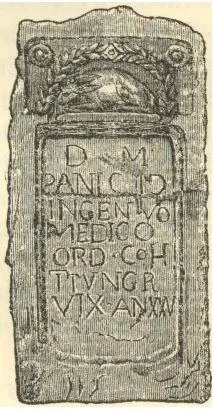George Borrow - The Bible in Spain. Volume 1 of 2
Здесь есть возможность читать онлайн «George Borrow - The Bible in Spain. Volume 1 of 2» — ознакомительный отрывок электронной книги совершенно бесплатно, а после прочтения отрывка купить полную версию. В некоторых случаях можно слушать аудио, скачать через торрент в формате fb2 и присутствует краткое содержание. Жанр: Путешествия и география, foreign_prose, foreign_language, на английском языке. Описание произведения, (предисловие) а так же отзывы посетителей доступны на портале библиотеки ЛибКат.
- Название:The Bible in Spain. Volume 1 of 2
- Автор:
- Жанр:
- Год:неизвестен
- ISBN:нет данных
- Рейтинг книги:5 / 5. Голосов: 1
-
Избранное:Добавить в избранное
- Отзывы:
-
Ваша оценка:
- 100
- 1
- 2
- 3
- 4
- 5
The Bible in Spain. Volume 1 of 2: краткое содержание, описание и аннотация
Предлагаем к чтению аннотацию, описание, краткое содержание или предисловие (зависит от того, что написал сам автор книги «The Bible in Spain. Volume 1 of 2»). Если вы не нашли необходимую информацию о книге — напишите в комментариях, мы постараемся отыскать её.
The Bible in Spain. Volume 1 of 2 — читать онлайн ознакомительный отрывок
Ниже представлен текст книги, разбитый по страницам. Система сохранения места последней прочитанной страницы, позволяет с удобством читать онлайн бесплатно книгу «The Bible in Spain. Volume 1 of 2», без необходимости каждый раз заново искать на чём Вы остановились. Поставьте закладку, и сможете в любой момент перейти на страницу, на которой закончили чтение.
Интервал:
Закладка:
My new friend, who had been bespeaking dinner, or rather breakfast, now, with great civility, invited me to partake of it, and at the same time introduced me to the officer who accompanied him, and who was his brother, and also spoke English, though not so well as himself. I found I had become acquainted with Don 36 36 So spelt by Borrow, but the correct Portuguese form is Dom .
Geronimo Jozé d’Azveto, secretary to the government at Evora; his brother belonged to a regiment of hussars, whose head-quarters were at Evora, but which had outlying parties along the road, – for example, the place where we were stopping.

Rabbits at Pegões 37 37 Rabbits were so numerous in the south of the Peninsula in Carthaginian and Roman times, that they are even said to have given their name ( Phœn. “Pahan”) to Hispania. Strabo certainly speaks of their number, and of the mode of destroying them with ferrets, and the rabbit is one of the commonest of the early devices of Spain (see Burke’s History of Spain , chap. ii.).
seem to be a standard article of food, being produced in abundance on the moors around. We had one fried, the gravy of which was delicious, and afterwards a roasted one, which was brought up on a dish entire; the hostess, having first washed her hands, proceeded to tear the animal to pieces, which having accomplished, she poured over the fragments a sweet sauce. I ate heartily of both dishes, particularly of the last; owing, perhaps, to the novel and curious manner in which it was served up. Excellent figs, from the Algarves, and apples, concluded our repast, which we ate in a little side room with a mud floor, which sent such a piercing chill into my system, as prevented me from deriving that pleasure from my fare and my agreeable companions that I should have otherwise experienced.
Don Geronimo had been educated in England, in which country he passed his boyhood, which in a certain degree accounted for his proficiency in the English language, the idiom and pronunciation of which can only be acquired by residing in the country at that period of one’s life. He had also fled thither shortly after the usurpation of the throne of Portugal by Don Miguel, and from thence had departed to the Brazils, where he had devoted himself to the service of Don Pedro, and had followed him in the expedition which terminated in the downfall of the usurper, and the establishment of the constitutional government in Portugal. Our conversation rolled chiefly on literary and political subjects, and my acquaintance with the writings of the most celebrated authors of Portugal was hailed with surprise and delight; for nothing is more gratifying to a Portuguese than to observe a foreigner taking an interest in the literature of his nation, of which, in many respects, he is justly proud.
At about two o’clock we were once more in the saddle, and pursued our way in company, through a country exactly resembling that which we had previously been traversing, rugged and broken, with here and there a clump of pines. The afternoon was exceedingly fine, and the bright rays of the sun relieved the desolation of the scene. Having advanced about two leagues, we caught sight of a large edifice towering majestically in the distance, which I learnt was a royal palace standing at the farther extremity of Vendas Novas, the village in which we were to pass the night; it was considerably more than a league from us, yet, seen through the clear transparent atmosphere of Portugal, it appeared much nearer.
Before reaching it we passed by a stone cross, on the pedestal of which was an inscription commemorating a horrible murder of a native of Lisbon, which had occurred on that spot; it looked ancient, and was covered with moss, and the greater part of the inscription was illegible – at least it was to me, who could not bestow much time on its deciphering. Having arrived at Vendas Novas, and bespoken supper, my new friend and myself strolled forth to view the palace. It was built by the late king of Portugal, and presents little that is remarkable in its exterior; it is a long edifice with wings, and is only two stories high, though it can be seen afar off, from being situated on elevated ground; it has fifteen windows in the upper, and twelve in the lower story, with a paltry-looking door, something like that of a barn, to which you ascend by one single step. The interior corresponds with the exterior, offering nothing which can gratify curiosity, if we except the kitchens, which are indeed magnificent, and so large that food enough might be cooked in them, at one time, to serve as a repast for all the inhabitants of the Alemtejo.
I passed the night with great comfort in a clean bed, remote from all those noises so rife in a Portuguese inn, and the next morning at six we again set out on our journey, which we hoped to terminate before sunset, as Evora is but ten leagues from Vendas Novas. The preceding morning had been cold, but the present one was far colder – so much so, that just before sunrise I could no longer support it on horseback, and therefore, dismounting, ran and walked until we reached a few houses at the termination of these desolate moors. It was in one of these houses that the commissioners of Don Pedro and Miguel met, 38 38 May 26, 1834.
and it was there agreed that the latter should resign the crown in favour of Dona Maria, for Evora was the last stronghold of the usurper, and the moors of the Alemtejo the last area of the combats which so long agitated unhappy Portugal. I therefore gazed on the miserable huts with considerable interest, and did not fail to scatter in the neighbourhood several of the precious little tracts with which, together with a small quantity of Testaments, my carpet-bag was provided.
The country began to improve; the savage heaths were left behind, and we saw hills and dales, cork-trees, and azinheiras , on the last of which trees grows that kind of sweet acorn called bolotas , which is pleasant as a chestnut, and which supplies in winter the principal food on which the numerous swine of the Alemtejo subsist. Gallant swine they are, with short legs and portly bodies of a black or dark red colour; and for the excellence of their flesh I can vouch, having frequently luxuriated upon it in the course of my wanderings in this province; the lombo , or loin, when broiled on the live embers, is delicious, especially when eaten with olives.
We were now in sight of Monte Moro, which, as the name denotes, was once a fortress of the Moors. It is a high steep hill, on the summit and sides of which are ruined walls and towers. At its western side is a deep ravine or valley, through which a small stream rushes, traversed by a stone bridge; farther down there is a ford, over which we passed and ascended to the town, which, commencing near the northern base, passes over the lower ridge towards the north-east. The town is exceedingly picturesque, and many of the houses are very ancient, and built in the Moorish fashion. I wished much to examine the relics of Moorish sway on the upper part of the mountain, but time pressed, and the short period of our stay at this place did not permit me to gratify my inclination.
Monte Moro is the head of a range of hills which cross this part of the Alemtejo, and from hence they fork east and south-east, towards the former of which directions lies the direct road to Elvas, Badajoz, and Madrid; and towards the latter that to Evora. A beautiful mountain, covered to the top with cork-trees, is the third of the chain which skirts the way in the direction of Elvas. It is called Monte Almo; a brook brawls at its base, and as I passed it the sun was shining gloriously on the green herbage, on which flocks of goats were feeding, with their bells ringing merrily, so that the tout ensemble resembled a fairy scene; and that nothing might be wanted to complete the picture, I here met a man, a goatherd, beneath an azinheira , whose appearance recalled to my mind the Brute Carle, mentioned in the Danish ballad of Swayne Vonved: — 39 39 The ballad of Svend Vonved, translated from the original Danish, was included by Borrow in his collection of Romantic Ballads , a thin demy 8vo volume of 187 pages – now very rare – published by John Taylor in 1826. The lines there read as follows: — “A wild swine sat on his shoulders broad, Upon his bosom a black bear snor’d.” The original ballad may be found in the Kjæmpe Viser , and was translated into German by Grimm, who expressed the greatest admiration for the poem. Svend in Danish means “swain” or “youth,” and it is characteristic of Borrow’s mystification of proper names that he should, by a quasi-translation and archaic spelling, give the title of the Danish ballad the appearance of an actual English surname.
Интервал:
Закладка:
Похожие книги на «The Bible in Spain. Volume 1 of 2»
Представляем Вашему вниманию похожие книги на «The Bible in Spain. Volume 1 of 2» списком для выбора. Мы отобрали схожую по названию и смыслу литературу в надежде предоставить читателям больше вариантов отыскать новые, интересные, ещё непрочитанные произведения.
Обсуждение, отзывы о книге «The Bible in Spain. Volume 1 of 2» и просто собственные мнения читателей. Оставьте ваши комментарии, напишите, что Вы думаете о произведении, его смысле или главных героях. Укажите что конкретно понравилось, а что нет, и почему Вы так считаете.












